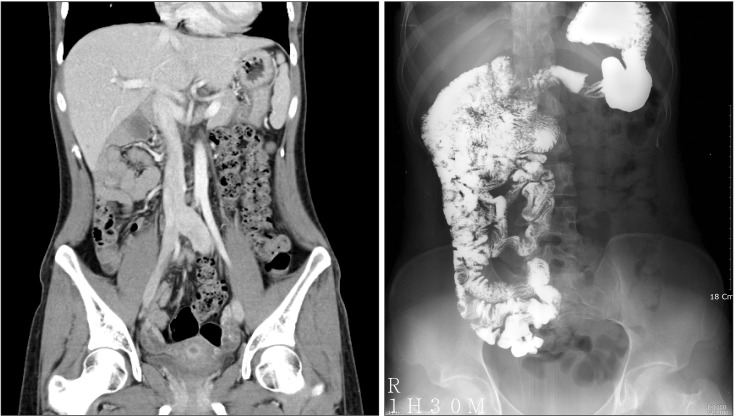Intest Res.
2015 Jul;13(3):287-290. 10.5217/ir.2015.13.3.287.
Familial Mediterranean Fever With Complete Symptomatic Remission During Pregnancy
- Affiliations
-
- 1Department of Internal Medicine, Dongtan Sacred Heart Hospital, Hallym University College of Medicine, Hwaseong, Korea. jhj1229@hallym.or.kr
- KMID: 2174490
- DOI: http://doi.org/10.5217/ir.2015.13.3.287
Abstract
- Familial Mediterranean fever (FMF) is an inherited autosomal recessive disorder, ethnically restricted and commonly found among populations surrounding the Mediterranean Sea. FMF is the most prevalent autoinflammatory disease; is characterized by recurrent, self-limited episodes of fever with serositis; and is caused by Mediterranean fever gene (MEFV) mutations on chromosome 16. We describe a case of adult-onset FMF with complete symptomatic remission during pregnancy, without the use of colchicine. A 25-year-old woman had presented with periodic fever, abdominal pain, and vomiting since she was 21. Her abdominal computed tomography scan showed intestinal nonrotation. She underwent exploratory laparotomy and appendectomy for her symptoms 1 year prior. She had a symptom-free pregnancy period, but abdominal pain and fever recurred after delivery. Mutation analysis of the MEFV gene revealed two point mutations (p.Leu110Pro and p.Glu148Gln). We report an adult female patient with FMF in Korea with complete symptomatic remission during pregnancy.
MeSH Terms
Figure
Cited by 1 articles
-
A Case of Schnitzler's Syndrome without Monoclonal Gammopathy-Associated Chronic Urticaria Treated with Anakinra
Min Joo Ahn, Ji Eun Yu, Jiung Jeong, Da Woon Sim, Young-Il Koh
Yonsei Med J. 2018;59(1):154-157. doi: 10.3349/ymj.2018.59.1.154.
Reference
-
1. Stojanov S, Kastner DL. Familial autoinflammatory diseases: genetics, pathogenesis and treatment. Curr Opin Rheumatol. 2005; 17:586–599. PMID: 16093838.
Article2. The International FMF Consortium. Ancient missense mutations in a new member of the RoRet gene family are likely to cause familial Mediterranean fever. Cell. 1997; 90:797–807. PMID: 9288758.3. Sohar E, Gafni J, Pras M, Heller H. Familial Mediterranean fever. A survey of 470 cases and review of the literature. Am J Med. 1967; 43:227–253. PMID: 5340644.4. Akar S, Soyturk M, Onen F, Tunca M. The relations between attacks and menstrual periods and pregnancies of familial Mediterranean fever patients. Rheumatol Int. 2006; 26:676–679. PMID: 16184383.
Article5. Yasar O, Iskender C, Kaymak O, Taflan Yaman S, Uygur D, Danisman N. Retrospective evaluation of pregnancy outcomes in women with familial Mediterranean fever. J Matern Fetal Neonatal Med. 2014; 27:733–736. PMID: 23981183.
Article6. Berkun Y, Ben-Chetrit E. Pyrin and cryopyrin - similar domain sequence but opposite inflammatory consequence. Clin Exp Rheumatol. 2007; 25(Suppl 45):S6–S8. PMID: 17949543.7. Cattan D, Notarnicola C, Molinari N, Touitou I. Inflammatory bowel disease in non-Ashkenazi Jews with familial Mediterranean fever. Lancet. 2000; 355:378–379. PMID: 10665562.
Article8. Gershoni-Baruch R, Brik R, Shinawi M, Livneh A. The differential contribution of MEFV mutant alleles to the clinical profile of familial Mediterranean fever. Eur J Hum Genet. 2002; 10:145–149. PMID: 11938447.
Article9. Tomiyama N, Higashiuesato Y, Oda T, et al. MEFV mutation analysis of familial Mediterranean fever in Japan. Clin Exp Rheumatol. 2008; 26:13–17. PMID: 18328141.10. Lim AL, Jang HJ, Han JW, et al. Familial Mediterranean fever: the first adult case in Korea. J Korean Med Sci. 2012; 27:1424–1427. PMID: 23166428.
Article11. Joo K, Park W, Chung MH, et al. Extensive thrombosis in a patient with familial Mediterranean fever, despite hyperimmunoglobulin D state in serum - first adult case in Korea. J Korean Med Sci. 2013; 28:328–330. PMID: 23400211.
Article12. Koo KY, Park SJ, Wang JY, et al. The first case of familial Mediterranean fever associated with renal amyloidosis in Korea. Yonsei Med J. 2012; 53:454–458. PMID: 22318840.13. Lee CG, Lim YJ, Kang HW, et al. A case of recurrent abdominal pain with fever and urticarial eruption. Korean J Gastroenterol. 2014; 64:40–44. PMID: 25073670.
Article14. Soriano A, Manna R. Familial Mediterranean fever: new phenotypes. Autoimmun Rev. 2012; 12:31–37. PMID: 22878273.
Article15. Ben-Chetrit E, Ben-Chetrit A. Familial Mediterranean fever and menstruation. BJOG. 2001; 108:403–407. PMID: 11305548.
Article16. Turgal M, Selcuk I, Ozyuncu O. Pregnancy outcome of five patients with renal amyloidosis regarding familial Mediterranean fever. Ren Fail. 2014; 36:306–308. PMID: 24168456.
Article17. Shand FH, Langenbach SY, Keenan CR, et al. In vitro and in vivo evidence for anti-inflammatory properties of 2-methoxyestradiol. J Pharmacol Exp Ther. 2011; 336:962–972. PMID: 21177477.
Article18. Kamath K, Okouneva T, Larson G, Panda D, Wilson L, Jordan MA. 2-Methoxyestradiol suppresses microtubule dynamics and arrests mitosis without depolymerizing microtubules. Mol Cancer Ther. 2006; 5:2225–2233. PMID: 16985056.
Article
- Full Text Links
- Actions
-
Cited
- CITED
-
- Close
- Share
- Similar articles
-
- Familial Mediterranean fever presenting as fever of unknown origin in Korea
- The First Case of Familial Mediterranean Fever Associated with Renal Amyloidosis in Korea
- Bloody Diarrhea as a Presentation Manifestation of Familial Mediterranean Fever in a Patient with Compound Heterozygote Mutations of the MEFV Gene
- Familial Mediterranean Fever: The First Adult Case in Korea
- A Case of Recurrent Abdominal Pain with Fever and Urticarial Eruption


